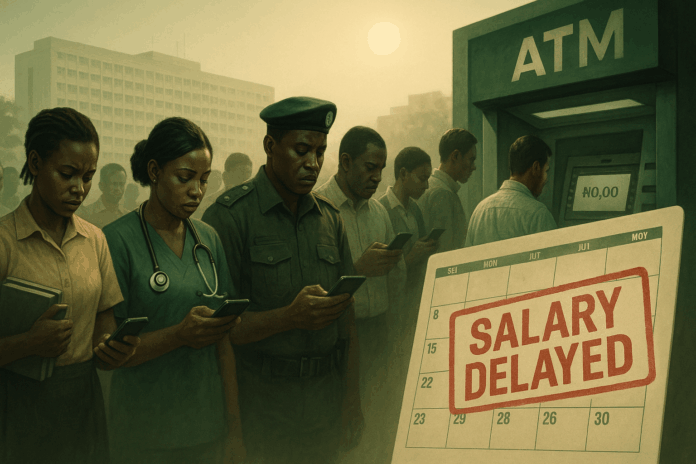Rent is due. Your child’s school fees are a week past the deadline. The market woman gives you that familiar side-eye because you owe her. And your salary? Nowhere in sight. This isn’t a dystopian fiction—it’s the lived reality for hundreds of thousands of Nigerian federal civil servants and university lecturers last month. The June salary delay crisis wasn’t just another bureaucratic hiccup; it was a seismic tremor exposing the fragile fault lines running through Nigeria’s public finance systems. Let’s pull back the curtain.
The Human Toll: When “Technical Glitch” Means Empty Pots
In the staff room of Abubakar Tafawa Balewa University, Bauchi, the air was thick with frustration. “We became laughing stocks in our own homes,” Professor Haruna Angulu confessed, describing the humiliation of lecturers unable to fulfill basic family obligations . This indignity sparked a nationwide strike by the Academic Staff Union of Universities (ASUU), who declared enough was enough after five months of payment delays tied to the chaotic migration from the Integrated Payroll and Personnel Information System (IPPIS) to the Government Integrated Financial Management Information System (GIFMIS) .
Meanwhile, at the Federal Capital Territory High Court, Abdulrazaq Yusuf of the Judiciary Staff Union (JUSUN) watched his members padlock courthouse gates. Their grievance? A toxic cocktail of unmet promises: the unimplemented N70,000 minimum wage, missing 25-35% salary increments, and five months of unpaid wage awards . “We are fighting for our rights,” Yusuf stated bluntly, capturing a sentiment echoing through empty bank accounts nationwide.
The Official Script: Network Glitches and Promised Fixes
The Office of the Accountant-General of the Federation (OAGF) offered a concise technical explanation: a “network glitch” at Zenith Bank disrupted salaries for workers across multiple Ministries, Departments, and Agencies (MDAs) . Director of Press Bawa Mokwa expressed regret, assuring that “prompt steps” were underway to resolve it while appealing for “calm and understanding” .
Beyond the glitch, Mokwa pointed to another simmering issue—outstanding arrears. He reaffirmed commitments to clear the lingering four-month backlog of the ₦35,000 wage award owed to eligible workers , payments initially promised in installments after April salaries but still haunting workers’ finances .
Digging Deeper: Systemic Cracks Behind the “Glitch”
1. The GIFMIS Migration Quagmire: ASUU President Prof. Chris Piwuna didn’t buy the “technical issues” narrative. “When funds are eventually released, there are no complaints… The system works; it’s the handlers who are stalling,” he countered, alleging deliberate negligence in the fraught transition from IPPIS to GIFMIS . This complex migration, ostensibly meant to grant universities more autonomy, instead birthed a recurring nightmare of delayed payments, suggesting inadequate testing, poor training, or worse—institutional indifference.
2. The Wage Award Arrears Albatross: The OAGF’s reassurance about clearing wage award arrears inadvertently highlighted a pattern: the government’s struggle to meet existing financial commitments. Promises made became debts unpaid, eroding trust long before the Zenith glitch. JUSUN’s protest over five months of missing wage awards underscored this chronic failure.
3. The Patchwork Response Culture: The reaction to salary delays often feels reactive and piecemeal—apologizing after the fact, fixing after strikes begin. Contrast this with Lagos State’s proactive stance: Governor Sanwo-Olu announced structured increases to N85,000, aiming for N100,000 by January 2025 based on budget planning . Where was the federal contingency planning?
4. The Communication Chasm: While Mokwa acknowledged frustration , the communication remained top-down and vague. Which MDAs were affected? When exactly would reprocessing occur? This opacity fuels suspicion and allows misinformation to thrive, as seen in ASUU’s skepticism about OAGF’s motives .
Beyond the Federal Gates: Echoes and Exceptions
The pain wasn’t uniform. While federal workers scrambled, some state-level actions offered stark contrasts:
- Abia State: Took tangible steps by settling long-delayed severance for sacked polytechnic staff .
- Lagos State: Demonstrated wage policy foresight with its planned, budgeted increases .
- Ogun State: Implemented a negotiated N77,000 minimum wage .
These examples highlight that salary stability is possible with political will and competent administration—making federal failures more glaring.
The Unanswered Questions (The Investigative Imperative)
While the Zenith glitch may be resolved and June salaries finally paid (ending the ASUU strike) , this crisis demands more than temporary fixes. As investigators, we must push for answers to systemic issues:
- GIFMIS Under the Microscope: Is the system fundamentally flawed, or is its implementation sabotaged by inadequate resources or personnel? Where is the independent audit?
- The Wage Award Black Hole: Why does the federal government consistently struggle to pay agreed wage awards on time? Is it a cash flow issue, bureaucratic inertia, or misplaced priorities?
- Transparency Deficit: Will the OAGF publish a full, real-time dashboard showing salary disbursement status across all MDAs and banks to rebuild trust?
- The Human Cost Audit: Has any government agency quantified the real impact—mental health crises, loan defaults, child labor—triggered by these delays on its workforce?
The Bottom Line: Salaries as a Litmus Test
A government’s most fundamental contract with its workers is simple: labor exchanged for timely wages. When that contract frays, everything else—productivity, trust, institutional stability—crumbles. The June salary crisis wasn’t just about a bank glitch; it was a symptom of deeper governance ailments: reactive crisis management, opaque communication, and a persistent failure to prioritize the humans behind the employee numbers.
As Professor Piwuna starkly framed it: “Our members are experiencing hardship” . Until the federal government treats that hardship as a critical malfunction demanding systemic overhaul—not just technical patches—these distressing headlines, padlocked gates, and empty kitchen pots will remain grimly familiar features of Nigeria’s public sector landscape. The glitch can be fixed today. Restoring broken trust? That requires a far more profound upgrade.


